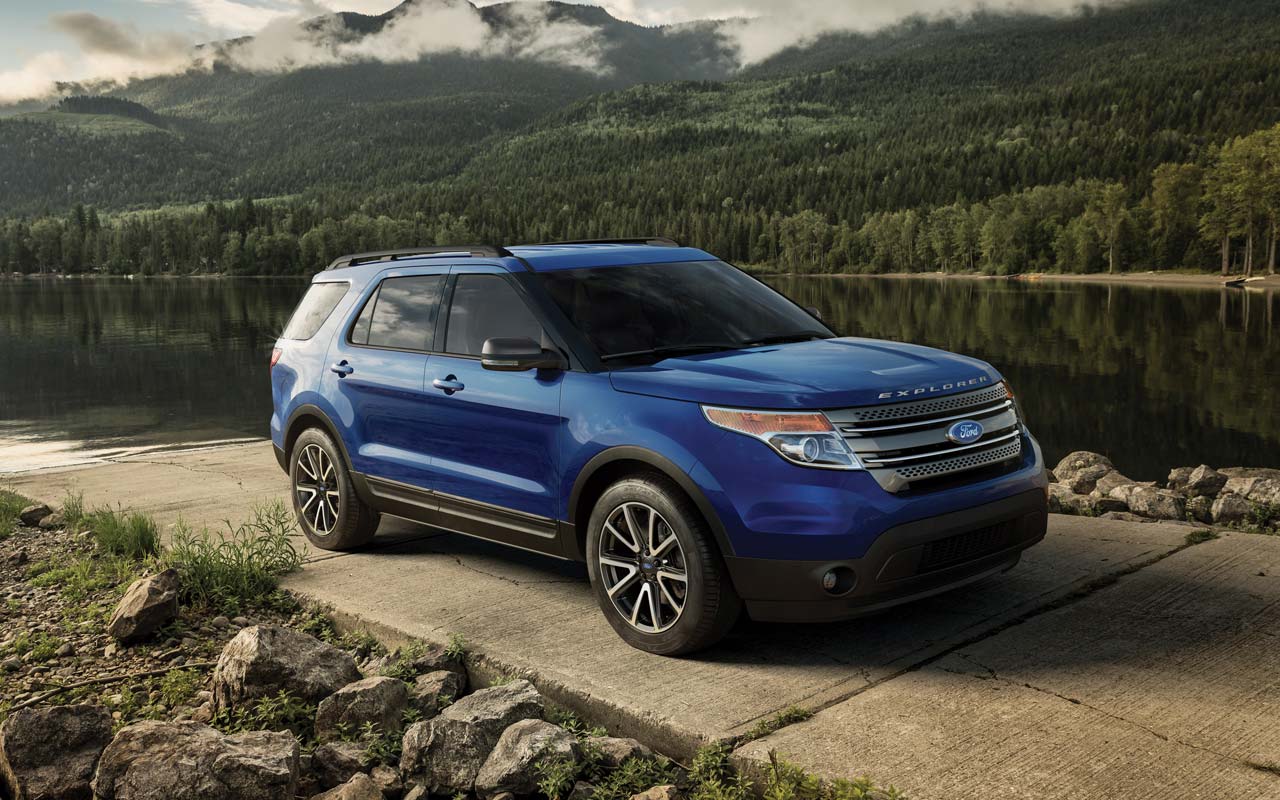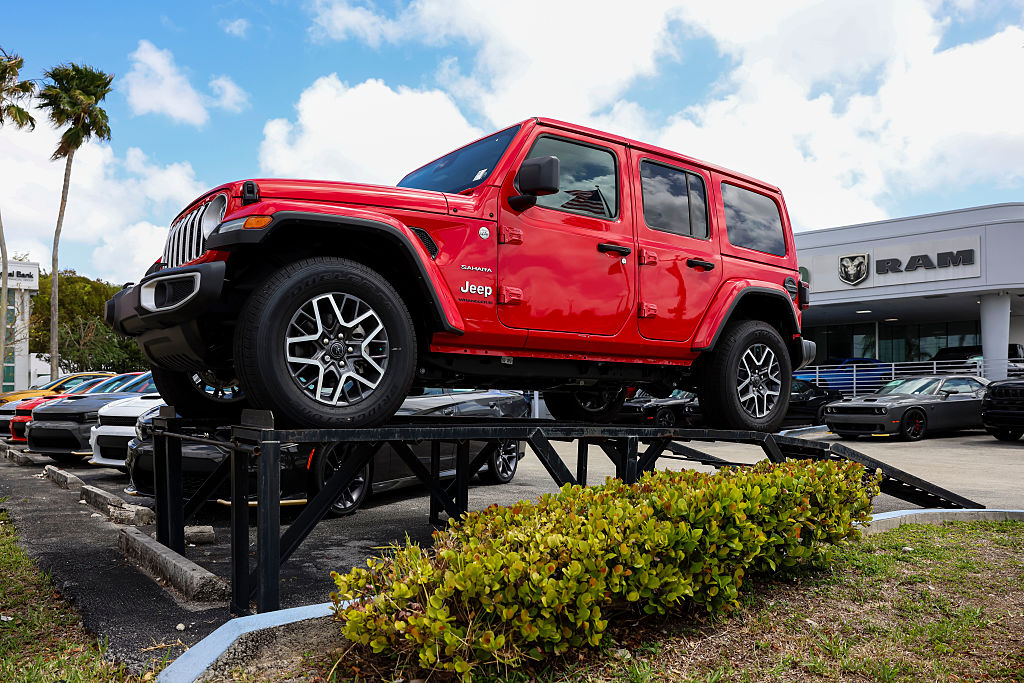How Much Will Car Prices Go Up With Tariffs?
Whether new, used, domestic or foreign, car prices are sure to rise with tariffs.


Profit and prosper with the best of Kiplinger's advice on investing, taxes, retirement, personal finance and much more. Delivered daily. Enter your email in the box and click Sign Me Up.
You are now subscribed
Your newsletter sign-up was successful
Want to add more newsletters?

Delivered daily
Kiplinger Today
Profit and prosper with the best of Kiplinger's advice on investing, taxes, retirement, personal finance and much more delivered daily. Smart money moves start here.

Sent five days a week
Kiplinger A Step Ahead
Get practical help to make better financial decisions in your everyday life, from spending to savings on top deals.

Delivered daily
Kiplinger Closing Bell
Get today's biggest financial and investing headlines delivered to your inbox every day the U.S. stock market is open.

Sent twice a week
Kiplinger Adviser Intel
Financial pros across the country share best practices and fresh tactics to preserve and grow your wealth.

Delivered weekly
Kiplinger Tax Tips
Trim your federal and state tax bills with practical tax-planning and tax-cutting strategies.

Sent twice a week
Kiplinger Retirement Tips
Your twice-a-week guide to planning and enjoying a financially secure and richly rewarding retirement

Sent bimonthly.
Kiplinger Adviser Angle
Insights for advisers, wealth managers and other financial professionals.

Sent twice a week
Kiplinger Investing Weekly
Your twice-a-week roundup of promising stocks, funds, companies and industries you should consider, ones you should avoid, and why.

Sent weekly for six weeks
Kiplinger Invest for Retirement
Your step-by-step six-part series on how to invest for retirement, from devising a successful strategy to exactly which investments to choose.
Few industries are more exposed to the new tariffs being imposed by the Trump administration than the car industry. And for car shoppers, that vulnerability spells higher prices and leaner inventories of cars on dealer lots.
A 25% tariff on imported automobile parts went into effect May 3, joining a 25% tariff on imported cars that went into effect in April. The tariffs will create burdens of at least $2,000 per car, according to Anderson Economic Group, and car buyers are likely soon to see that ripple effect.
Shortly after those tariffs went into effect, it was reported that Ford is raising prices on its cars, including popular models. The reported price hikes are hitting models made in Mexico, with increases up to $2,000 per model — a good example of what many car companies are likely to do if the tariffs are not cancelled or substantially reduced.
From just $107.88 $24.99 for Kiplinger Personal Finance
Become a smarter, better informed investor. Subscribe from just $107.88 $24.99, plus get up to 4 Special Issues

Sign up for Kiplinger’s Free Newsletters
Profit and prosper with the best of expert advice on investing, taxes, retirement, personal finance and more - straight to your e-mail.
Profit and prosper with the best of expert advice - straight to your e-mail.
Take a look at what you might see at the dealer in the near future.
Is there a truly American car?
To understand the impact of tariffs on car manufacturing, it’s important to realize that there is no such thing as a truly “American” car.
Ford, GM and the U.S. brands under the Stellantis umbrella, such as Jeep, Ram and Dodge, assemble many but not all of their vehicles in U.S. plants. GM, for instance, imports many of its popular Silverado pickup trucks from Mexico. And even cars assembled in, say, Michigan are full of parts and materials that originated outside of the U.S.
Likewise, many Asian and European brands assemble vehicles in the U.S., particularly in plants located in the South. But again, they rely on a complicated mix of domestic and imported parts and materials. Some automotive parts cross a border multiple times before ending up in a fully assembled car that’s ready to hit a dealer’s showroom.
Auto tariffs and their impact

President Donald Trump’s new 25% tariffs on auto imports, including imported parts that don’t comply with the rules of the U.S.-Canada-Mexico trade pact he negotiated in his first term, are already starting to raise prices on cars for sale on lots now, according to anecdotal accounts.
Other tariffs, such as those on imported steel and aluminum — two key car-making materials — are bound to push up manufacturers’ costs, too.
Trump announced the auto tariffs in late March, calling them "permanent." He did, however, make some amendments to the tariffs to create some carve-outs and give businesses time to adjust.
Estimates of how much more cars will cost vary, but the consensus among forecasters is that the impact will be painful.
How much will tariffs raise new car prices?
The staff of The Kiplinger Letter estimates that new car prices will rise by $5,000 to $10,000 in the case of foreign brands, and $3,000 for domestic vehicles.
In an analysis of the car-specific tariffs last month, Edmunds.com head of insights Jessica Caldwell noted that “it’s reasonable to expect that vehicle prices will rise, which presents an added challenge to an industry that is already grappling with ongoing affordability concerns.” Edmunds' data show that the average transaction price of a new vehicle in February was already $47,373, before any tariffs began.
Vehicle availability also figures to worsen, as some key components or materials that used to be imported become prohibitively expensive and manufacturers struggle to line up domestically sourced replacements.
One source at a major automotive supplier tells the Letter that identifying and testing vehicle parts from a new supplier can be a months-long process. And as we witnessed recently with the semiconductor shortage, lacking even one or two components can slow or idle assembly lines, leading to shortages of new cars for sale.
Will used car prices go up because of tariffs?

Price hikes and less inventory may push would-be buyers to look at the used market instead of buying a new car. That in turn spells higher prices and more competition there, too.
Because of the supply chain problems that hampered production of new cars a few years ago, fewer vehicles were leased at the time, and so fewer lightly used, high-quality leased vehicles will be entering the used market now, just as more shoppers will be jockeying for them.
What other car costs could rise with tariffs?
Even if you aren’t planning to buy a car – new or used – what happens on dealer lots is likely to affect you in other ways. For instance, the new tariffs on imported parts are going to push up repair and maintenance costs for all drivers, on everything from body work to routine brake jobs.
Car insurance premiums, which are already way up since the pandemic, figure to rise more, too, as repairing cars gets more expensive. Read more about by how much auto tariffs may raise your car insurance rates.
And even if you don’t own a car, but rent one when you travel, you can expect higher rental rates and fewer options at rental agencies.
Should you buy a car before tariffs have a bigger impact?
The bottom line: If you’re in the market for a car, already own one or ever plan to rent one, you’re going to pay for the new automotive tariffs one way or another.
But before you rush to the dealer before tariffs reverberate, keep in mind it's always best to buy a car because you need it, not because you're afraid the car you want could become too expensive in the future or unavailable altogether.
Even before the new tariffs, prices were already high and inventories were limited, so it paid to be flexible about what to buy — and what features you really prioritize. That will be even more true now as the auto tariffs affect the market.
Don't let fear pressure you into buying. Focus on your personal situation, whether you need a new car, and what you really need from that car.
Related Content
- Luxury Cars With Few Recalls This Past Decade
- See How Much Auto Tariffs Could Raise Your Car Insurance Rates
- How Do Tariffs Impact the Stock Market?
- How Tariffs Work and What They Mean for You in 2025
Profit and prosper with the best of Kiplinger's advice on investing, taxes, retirement, personal finance and much more. Delivered daily. Enter your email in the box and click Sign Me Up.

Jim joined Kiplinger in December 2010, covering energy and commodities markets, autos, environment and sports business for The Kiplinger Letter. He is now the managing editor of The Kiplinger Letter and The Kiplinger Tax Letter. He also frequently appears on radio and podcasts to discuss the outlook for gasoline prices and new car technologies. Prior to joining Kiplinger, he covered federal grant funding and congressional appropriations for Thompson Publishing Group, writing for a range of print and online publications. He holds a BA in history from the University of Rochester.
-
 Quiz: Do You Know How to Avoid the "Medigap Trap?"
Quiz: Do You Know How to Avoid the "Medigap Trap?"Quiz Test your basic knowledge of the "Medigap Trap" in our quick quiz.
-
 5 Top Tax-Efficient Mutual Funds for Smarter Investing
5 Top Tax-Efficient Mutual Funds for Smarter InvestingMutual funds are many things, but "tax-friendly" usually isn't one of them. These are the exceptions.
-
 AI Sparks Existential Crisis for Software Stocks
AI Sparks Existential Crisis for Software StocksThe Kiplinger Letter Fears that SaaS subscription software could be rendered obsolete by artificial intelligence make investors jittery.
-
 5 Top Tax-Efficient Mutual Funds for Smarter Investing
5 Top Tax-Efficient Mutual Funds for Smarter InvestingMutual funds are many things, but "tax-friendly" usually isn't one of them. These are the exceptions.
-
 Why Invest In Mutual Funds When ETFs Exist?
Why Invest In Mutual Funds When ETFs Exist?Exchange-traded funds are cheaper, more tax-efficient and more flexible. But don't put mutual funds out to pasture quite yet.
-
 Social Security Break-Even Math Is Helpful, But Don't Let It Dictate When You'll File
Social Security Break-Even Math Is Helpful, But Don't Let It Dictate When You'll FileYour Social Security break-even age tells you how long you'd need to live for delaying to pay off, but shouldn't be the sole basis for deciding when to claim.
-
 I'm an Opportunity Zone Pro: This Is How to Deliver Roth-Like Tax-Free Growth (Without Contribution Limits)
I'm an Opportunity Zone Pro: This Is How to Deliver Roth-Like Tax-Free Growth (Without Contribution Limits)Investors who combine Roth IRAs, the gold standard of tax-free savings, with qualified opportunity funds could enjoy decades of tax-free growth.
-
 One of the Most Powerful Wealth-Building Moves a Woman Can Make: A Midcareer Pivot
One of the Most Powerful Wealth-Building Moves a Woman Can Make: A Midcareer PivotIf it feels like you can't sustain what you're doing for the next 20 years, it's time for an honest look at what's draining you and what energizes you.
-
 Stocks Make More Big Up and Down Moves: Stock Market Today
Stocks Make More Big Up and Down Moves: Stock Market TodayThe impact of revolutionary technology has replaced world-changing trade policy as the major variable for markets, with mixed results for sectors and stocks.
-
 I'm a Wealth Adviser Obsessed With Mahjong: Here Are 8 Ways It Can Teach Us How to Manage Our Money
I'm a Wealth Adviser Obsessed With Mahjong: Here Are 8 Ways It Can Teach Us How to Manage Our MoneyThis increasingly popular Chinese game can teach us not only how to help manage our money but also how important it is to connect with other people.
-
 Looking for a Financial Book That Won't Put Your Young Adult to Sleep? This One Makes 'Cents'
Looking for a Financial Book That Won't Put Your Young Adult to Sleep? This One Makes 'Cents'"Wealth Your Way" by Cosmo DeStefano offers a highly accessible guide for young adults and their parents on building wealth through simple, consistent habits.